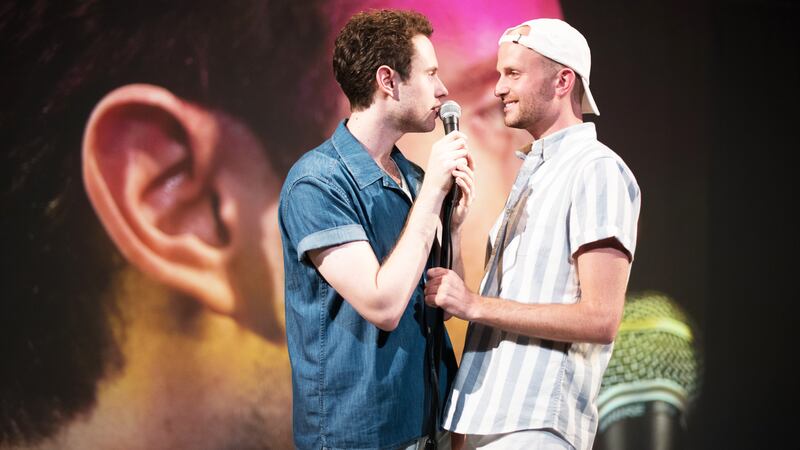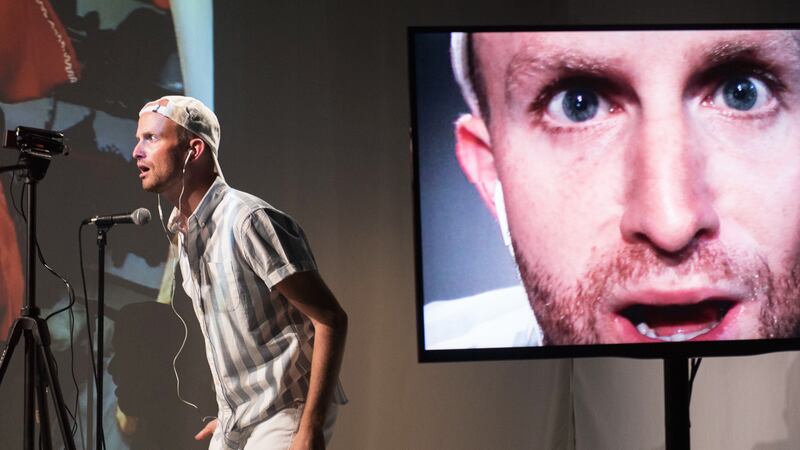Eight years on, you groan to yourself that it should still be so familiar: the sight of psychic Allison DuBois in a notorious episode of Real Housewives of Beverly Hills puffing on her e-cigarette, jokily threatening murder, and telling Kyle Richards of her hot husband, Mauricio: “He will never emotionally fulfill you. Never. Know that.”
And then, as it so often does in any Real Housewives franchise, all hell breaks loose. The moment of all hell breaking loose is when a “housewife” shows her mettle. Will she sink, swim, back off, or scrap? Who will land the bitchy zinger? Who will cry? Who will play the victim? Who will rescue? Who will strip and fall over? Who is really a friend? Who is really at war?
Or are Bravo’s “housewives” just, as in fictional drama, merely casts of characters acting out for us? And why do their fans invest so much in all of this?
The audience walking into Michael Breslin and Patrick Foley’s very funny and deeper-than-you-might-expect play This American Wife is first greeted by two TV screens showing the “psychic” episode of the Beverly Hills franchise.

Patrick Foley and Michael Breslin in ‘This American Wife.’
Marielle SolanFirst, it starts on one screen, then two because the cacophony of argument coalesces over other familiar elements of the shows: the musical strings to signal shock or surprise, the lingering camera shots of stunned faces (or as stunned as overly operated-on or Botoxed faces can look), and the on-camera confessionals where the women commentate about the action on screen.
Breslin and Foley appear and tell us, breathily via microphone and in spotlight, about their own close encounters with housewives, and their self-aware though not apologetic humor—this insane, bug-eyed obsession—will mean most to fans of the “housewives” (who really should book tickets immediately).
Those of us who knew exactly what they were talking about winced and laughed hard; those who did not looked askance. There was Foley’s professed love for Alex McCord and her “feral children,” her desperate desire to belong. Breslin’s close encounter with Kelly Bensimon on the streets of New York transformed his day into something halcyon.
Breslin and Foley’s show is on one level simple, brilliant comedy. They watch every Real Housewives franchise (of Atlanta, New York, Beverly Hills, Orange County, New Jersey, Potomac, Dallas; R.I.P. D.C. and Miami), and they act out—inflection, faint accent, and heavy-pause perfect—certain scenes and confrontations fans know all too well: Kim Richards versus Eileen Davidson; Caroline Manzo versus Danielle Staub. These are deliciously spot-on.
The men leap over chairs in time to the plinky-plonk theme. The re-enactments are sharply well-executed; Andy Cohen must have the two of them on Watch What Happens Live immediately to lead a segment of “Housewife Playhouse.” It’s not easy to do Vicki Gunvalson’s vicious screech/snort, or LeeAnne Locken’s terrifying growl; Foley and Breslin have, masters of their craft, nailed both.
We know, by way of their introduction, that as well as hymning the pleasures of the series—the ridiculous camp, drama, and comedy of the franchises—the shows also provide a trickier lens for the duo to ask each other about their own lives, their own realities, and their willed retreat from these realities.
In response to some questions by email, the men told me: “We both are and are not playing ourselves. We like talking about it like we’re playing our ‘personas’—a blend of fact/fiction (like the Housewives). We definitely love the Housewives! There are strong autobiographical elements in the play.”
In the show, each man asks about the other’s family, about love, sex, and intimacy, and each time the man is questioned he defers or deflects the question into discussing another piece of Real Housewife arcana.
The pointed implication is that the shows offer their own variety of escape and projection to their viewers. They are not “real” at all, and they provide an escape from reality too.
This American Wife is both loving satire of the pleasures and madnesses of the franchise, and piercing examination as to why this madness is so compelling; what it offers to fans and what it says about them.
The men are aware of the darker nature of the shows: None of us fans laugh at being reminded of the limousine confrontation between Kyle Richards and her sister Kim, because—if you don’t know the show, as some in the audience did not—it seemed, like the “housewives” must seem to outsiders, as an utterly baffling crucible of shrieking and accusation. If you do know the show, you know the sisters’ relationship, and Kim Richards’ own struggles seem more painful than funny.
The cyclical nature of the storylines is cleverly underscored by Breslin and Foley: Just like soap opera divas the housewives know they must re-enact, over and over again if they are retained for multiple seasons, cycles of love, loss, gain, weight gained, weight lost, heartbreak, flirtation, being cheated on, discovery of the same, drinking, sobriety, deep friendship, vicious fallings-out, jail, release, recovery, falling down, rising up, phoenix from the ashes. And how do you pronounce Giudice?
One season you’re the queen, the next you’re a villain. The “new girls” get hazed. Will you be a one-season non-wonder?
Listening to the men purr the name “Shannon Beador” reminds you that this Orange County “housewife” is the present apotheosis of the rollercoaster; although, for her embracing of post-marital breakdown “fun,” you can also see—as she cuts loose with Tamra and Vicky in Mexico right now—that she is heartbroken.
The women on the show plaster fun on her to magic the pain they don’t want to see, and Shannon does not want to feel, away. She looks as if she just wants to lie down, curl up, crumble. But no housewife ever gives herself over to the inertia of severe depression. The party must go on.
The duo use the cameras and screens on Stephanie Osin Cohen’s sparsely furnished stage to film each other, and to create effects like multiple images of each other’s faces. We see them in close-up, as well as seeing them in front of us. Are we easier watching the men on screen, or in person?
This is a telling use of technology: What are we projecting on to these scripted, confected real-life, not-real-life TV stars? When one of the men thrash-dances, wearing a “housewives” wig, it is both fun, physical exhibitionism and an expression of madness.
How the men perform the show, and film themselves for us, echoes the hall of mirrors of watching the show; Krista Smith’s lighting, Michael Costagliola's sound, and Wladimiro A. Woyno’s projections are vital elements in this performance.
There are glancing moments of ballet interspersed with the skits and badinage, and later a dizzying video of drag and demi-drag as the men squeeze into the kind of silvery, tight dresses a “housewife” wears for her opening titles’ shots.
Just as the women on the shows show us their most outrageous selves, those selves may not be the most honest and intimate. Who are they really? Breslin and Foley play a similar game of conceal-and-reveal around sex, desire, being gay (or a “gay bisexual man,” as Breslin calls himself), and with each other. Who do they love, what has been painful for them, what has been meaningful? Every time the men reach the precipice of significant personal revelation or painful confession, there’s a beat... and...
Let’s re-enact the most insane vacations taken on the franchises, when the women go abroad and drink and strip and argue in even more extremis than they do at home.
This is the best sequence in the show, dominated by the New York cast’s sunburned apocalypses (LuAnn’s flirtation with a pirate, her drunken tumble into bushes, Sonja’s naked pool diving, Kelly Bensimon’s meltdown), and impressively takes devoted fans right up to the “boat trip from hell” that broadcast on Wednesday night’s Real Housewives of New York.

Michael Breslin in ‘This American Wife.’
Marielle SolanToward the end, Foley sits, as the housewives do for such segments, to supply a commentary to Breslin standing behind a camera. There’s a green screen, upon which a luxe interior is projected, and Foley drones in on the self-indulgent, self-deluded way the housewives do in front of such faked backdrops, complete with immaculate head-tilting.
The men understand that the “housewives” are circus performers, orbiting both reality and theatricality. But who, they ask, are we watching this circus? As Breslin and Foley watch the women they also watch themselves, seduced, titillated, humored, and disturbed.
This American Wife is at Next Door at New York Theatre Workshop, until Aug. 11. Book here.






